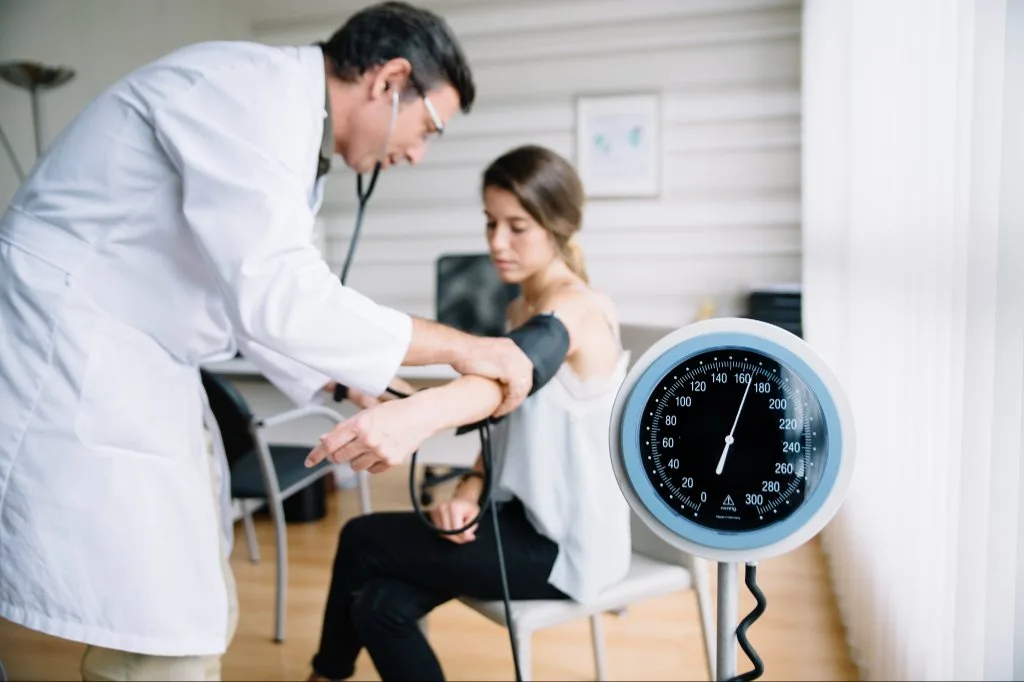Car accidents are often associated with visible injuries like broken bones or whiplash, but their impact can extend far beyond physical trauma. Sometimes, a collision’s stress and physiological effects can lead to unexpected health issues, such as elevated blood pressure.
A car accident can cause high blood pressure due to factors like physical and emotional stress. Understanding the potential outcomes after such an event can help you recognize and address hidden health concerns following an accident.
Why Blood Pressure Increases After a Car Accident
A car accident can be a profoundly stressful experience, triggering the body’s “fight-or-flight” response—a survival mechanism that prepares you to confront or evade immediate threats. This response activates the sympathetic nervous system, releasing stress hormones like adrenaline and cortisol.
The Fight-or-Flight Response and Its Impact
Adrenaline, often called the “fight-or-flight hormone,” increases heart rate, elevates blood pressure, and boosts energy supplies to prepare the body for action. Cortisol complements these effects by suppressing non-essential functions to maintain focus and alertness. Together, these hormones drive rapid physiological changes such as heightened senses, rapid breathing, and increased heart rate, which can also lead to feelings of anxiety and jitteriness.
Physical Injuries and Their Effect on High Blood Pressure
Experiencing a car accident can lead to various physical injuries that significantly impact cardiovascular function, often resulting in elevated blood pressure.
- Organ Damage: Injuries to organs like the kidneys can directly disrupt blood pressure regulation.
- Pain Response: Acute pain releases stress hormones, temporarily spiking blood pressure. Chronic pain, however, sustains hypertension due to prolonged sympathetic activation.
- Inflammation: The body’s healing process often triggers inflammation, which can increase blood pressure and heighten cardiovascular risks.
Psychological Stress and Blood Pressure
Experiencing a car accident can lead to significant psychological stress, manifesting as anxiety, depression, or post-traumatic stress disorder (PTSD). This emotional turmoil doesn’t just affect mental well-being; it can also have profound physiological consequences, particularly concerning blood pressure.PTSD and Cardiovascular Risk: Individuals with PTSD, a common aftermath of severe car accidents, often exhibit increased basal heart rates and higher blood pressure levels.
Signs of High Blood Pressure You Can Have After a Car Accident

These are the main symptoms of high blood pressure that may occur after a car accident. It’s crucial to recognize these signs and start treating them.
- Headaches: Severe headaches, especially those that occur suddenly, can indicate increased blood pressure. Post-accident stress and trauma may contribute to these headaches.
- Dizziness: Elevated blood pressure can cause lightheadedness or dizziness, potentially indicating that the cardiovascular system is under strain.
- Chest Pain: Experiencing chest pain after an accident should never be ignored, as it may signify elevated blood pressure or other serious cardiovascular issues.
If headaches, dizziness, or chest pain continue for more than a few hours or days after the accident, it could indicate underlying issues such as sustained elevated blood pressure. Additional symptoms, such as shortness of breath, vision changes, or swelling, may suggest complications requiring immediate medical evaluation.
If these symptoms interfere with your ability to perform daily tasks or intensify with physical activity, you must seek medical attention promptly.
Managing Stress and High Blood Pressure Post-Car Accident
Here are some ways to manage high blood pressure after a car accident.
- Psychological Interventions: Seeking therapy or counseling can help address the psychological aftermath of a car accident, thereby potentially mitigating their impact on blood pressure.
- Medical Monitoring: Regular check-ups with healthcare providers are essential to monitor blood pressure levels and assess cardiovascular health. Early detection of hypertension allows for timely interventions, reducing the risk of long-term complications.
- Lifestyle Modifications: Incorporating stress-reduction techniques such as mindfulness meditation, yoga, regular physical activity, and maintaining a healthy diet can aid in managing both psychological stress and blood pressure.
- Chiropractic Care: Chiropractic adjustments can help realign the spine, improving nervous system function and circulation. This non-invasive approach may reduce physical stress, alleviate pain, and support blood pressure regulation.
How Affordable Chiropractic Killeen Can Help You Reduce High Blood Pressure
Affordable Chiropractic Killeen offers comprehensive services with a noninvasive, drug-free approach tailored to individuals recovering from car accidents. This approach helps manage this condition by focusing on the body’s natural healing processes.
We employ several techniques to address high blood pressure, including:
- Spinal Adjustments: Realigning the spine can improve nervous system function and has been associated with reductions in blood pressure.
- Stress Reduction: Chiropractic care can alleviate physical discomfort, reduce stress levels, and lower blood pressure.
- Enhanced Circulation: Adjustments may improve blood flow, ensuring oxygen and nutrients are efficiently delivered to tissues. This may promote healing and potentially aid in blood pressure regulation.
Benefits of Choosing Affordable Chiropractic Killeen
- Personalized Treatment Plans: Chiropractors assess each patient’s unique condition to develop customized care strategies that address both injury recovery and blood pressure management.
- Natural Healing: Our approach avoids medication side effects, focusing on restoring balance and supporting the body’s inherent ability to heal.
- Holistic Health Improvement: Besides managing blood pressure, chiropractic treatments can enhance overall well-being, improve mobility, reduce pain, and support mental health.
Adding chiropractic care to your post-accident recovery plan can be a transformative step toward better health, prioritizing both your physical and emotional well-being.
Take the next step toward recovery—schedule an appointment today! Let us help you heal with personalized chiropractic care designed to support your health and recovery goals.

